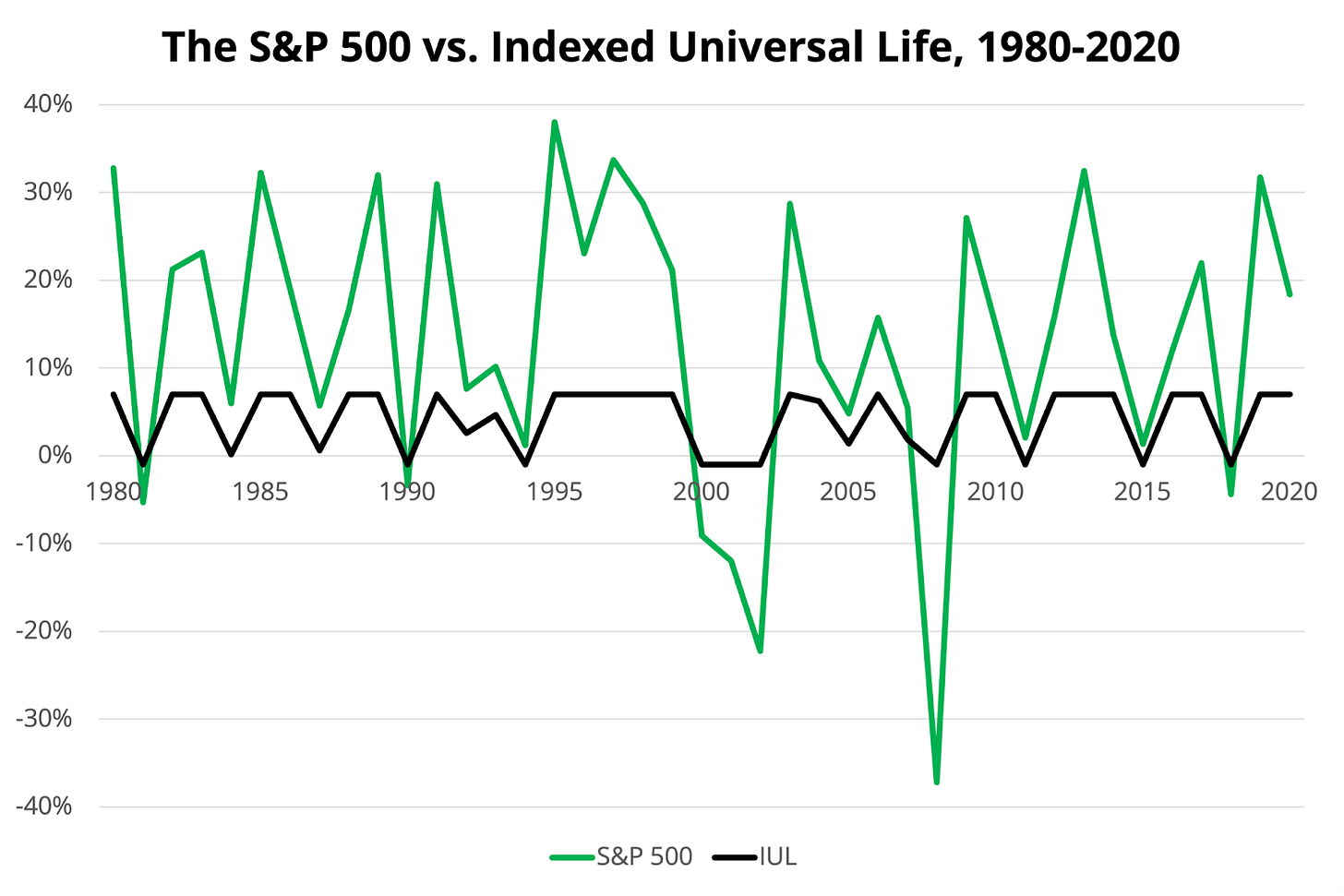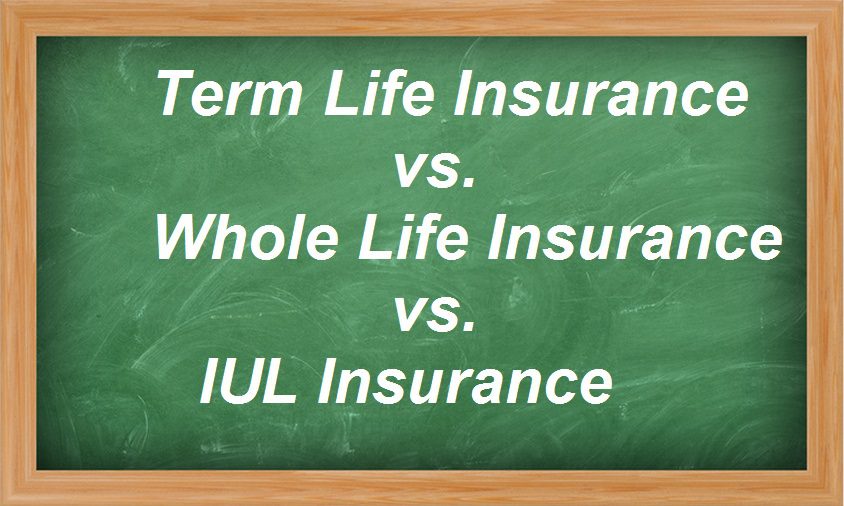All Categories
Featured
Table of Contents
Do they contrast the IUL to something like the Vanguard Overall Stock Market Fund Admiral Shares with no load, an expenditure ratio (ER) of 5 basis points, a turnover proportion of 4.3%, and a phenomenal tax-efficient record of distributions? No, they contrast it to some terrible proactively handled fund with an 8% tons, a 2% ER, an 80% turn over ratio, and a dreadful document of temporary funding gain distributions.
Mutual funds typically make annual taxed circulations to fund owners, also when the value of their fund has decreased in value. Common funds not only call for earnings coverage (and the resulting annual taxation) when the mutual fund is rising in worth, however can additionally impose revenue taxes in a year when the fund has actually gone down in value.
You can tax-manage the fund, gathering losses and gains in order to minimize taxed circulations to the financiers, but that isn't in some way going to transform the reported return of the fund. The ownership of mutual funds may need the common fund owner to pay approximated tax obligations (universal insurance payment).
:max_bytes(150000):strip_icc()/pros-cons-indexed-universal-life-insurance.asp_v1-e119226901bc464593a496c003551ea0.png)
IULs are easy to place to ensure that, at the owner's death, the recipient is exempt to either earnings or estate tax obligations. The same tax obligation decrease techniques do not work almost as well with common funds. There are numerous, usually costly, tax obligation catches connected with the timed trading of shared fund shares, catches that do not use to indexed life insurance policy.
Chances aren't really high that you're mosting likely to be subject to the AMT as a result of your common fund circulations if you aren't without them. The remainder of this one is half-truths at best. As an example, while it holds true that there is no revenue tax obligation due to your successors when they inherit the earnings of your IUL policy, it is likewise real that there is no revenue tax obligation due to your successors when they acquire a common fund in a taxable account from you.
Financial Foundation Index Universal Life
The federal inheritance tax exemption restriction is over $10 Million for a couple, and expanding annually with inflation. It's a non-issue for the vast majority of medical professionals, much less the rest of America. There are much better ways to stay clear of estate tax obligation problems than acquiring investments with low returns. Shared funds might trigger earnings tax of Social Safety benefits.

The growth within the IUL is tax-deferred and might be taken as free of tax income via finances. The policy proprietor (vs. the mutual fund supervisor) is in control of his or her reportable income, thus allowing them to decrease and even remove the taxes of their Social Security benefits. This set is great.
Below's another minimal problem. It holds true if you get a mutual fund for state $10 per share simply prior to the circulation date, and it disperses a $0.50 circulation, you are after that going to owe tax obligations (most likely 7-10 cents per share) although that you haven't yet had any kind of gains.
In the end, it's really concerning the after-tax return, not exactly how much you pay in taxes. You are going to pay even more in taxes by using a taxable account than if you purchase life insurance coverage. You're additionally most likely going to have even more money after paying those taxes. The record-keeping needs for owning common funds are dramatically extra complex.
With an IUL, one's documents are kept by the insurer, duplicates of yearly statements are sent by mail to the owner, and circulations (if any kind of) are totaled and reported at year end. This set is additionally sort of silly. Naturally you need to maintain your tax documents in instance of an audit.
Universal Life Insurance Broker
All you need to do is shove the paper right into your tax obligation folder when it appears in the mail. Rarely a reason to buy life insurance policy. It's like this individual has actually never ever purchased a taxed account or something. Mutual funds are commonly part of a decedent's probated estate.
Furthermore, they go through the delays and expenses of probate. The earnings of the IUL policy, on the other hand, is always a non-probate distribution that passes beyond probate directly to one's named beneficiaries, and is as a result exempt to one's posthumous financial institutions, undesirable public disclosure, or similar hold-ups and expenses.
We covered this set under # 7, yet simply to recap, if you have a taxable mutual fund account, you must put it in a revocable count on (and even less complicated, make use of the Transfer on Fatality classification) to avoid probate. Medicaid disqualification and life time income. An IUL can supply their owners with a stream of earnings for their whole life time, despite how much time they live.

This is valuable when arranging one's events, and transforming possessions to income before a retirement home confinement. Mutual funds can not be transformed in a comparable manner, and are virtually constantly thought about countable Medicaid assets. This is another dumb one supporting that poor individuals (you understand, the ones who need Medicaid, a federal government program for the poor, to pay for their nursing home) should use IUL as opposed to common funds.
Fixed Indexed Universal Life
And life insurance looks awful when contrasted fairly versus a retirement account. Second, individuals that have cash to purchase IUL above and past their retirement accounts are going to have to be dreadful at taking care of money in order to ever before receive Medicaid to spend for their assisted living facility prices.
Chronic and incurable ailment rider. All policies will permit a proprietor's easy access to cash money from their policy, often waiving any type of surrender penalties when such people endure a major disease, require at-home treatment, or end up being constrained to an assisted living home. Mutual funds do not supply a similar waiver when contingent deferred sales charges still relate to a shared fund account whose proprietor needs to offer some shares to money the prices of such a stay.
Index Universal Life Vs Roth Ira
Yet you reach pay more for that benefit (rider) with an insurance plan. What a lot! Indexed global life insurance policy provides fatality advantages to the beneficiaries of the IUL owners, and neither the owner neither the beneficiary can ever before lose money as a result of a down market. Mutual funds supply no such warranties or fatality advantages of any type of kind.
I absolutely do not require one after I reach financial self-reliance. Do I desire one? On average, a purchaser of life insurance policy pays for the real expense of the life insurance benefit, plus the prices of the plan, plus the profits of the insurance coverage firm.
Iul Life Insurance Policy
I'm not completely sure why Mr. Morais tossed in the entire "you can't shed money" once more here as it was covered rather well in # 1. He simply intended to duplicate the very best marketing point for these things I intend. Again, you do not shed small bucks, however you can lose actual dollars, in addition to face severe possibility expense because of reduced returns.

An indexed global life insurance plan proprietor may exchange their policy for a totally different policy without activating earnings tax obligations. A mutual fund proprietor can stagnate funds from one shared fund company to one more without marketing his shares at the previous (therefore activating a taxable occasion), and redeeming brand-new shares at the last, usually subject to sales costs at both.
While it is true that you can exchange one insurance plan for one more, the factor that individuals do this is that the first one is such a terrible policy that also after buying a brand-new one and experiencing the early, negative return years, you'll still come out in advance. If they were sold the appropriate plan the very first time, they shouldn't have any desire to ever trade it and undergo the early, negative return years again.
Latest Posts
Iul Benefits
The Difference Between Whole Life And Universal Life Insurance
Cap Life Insurance